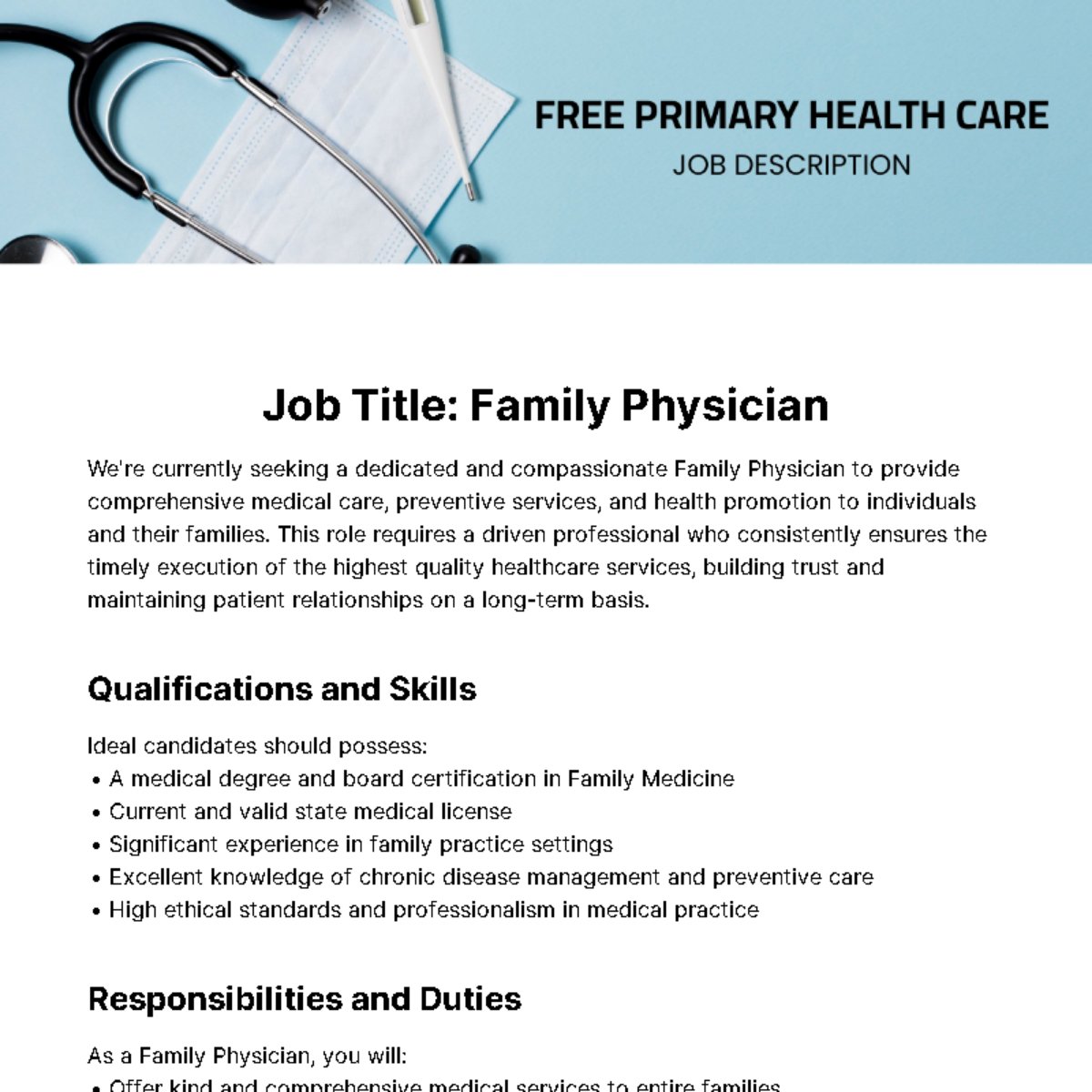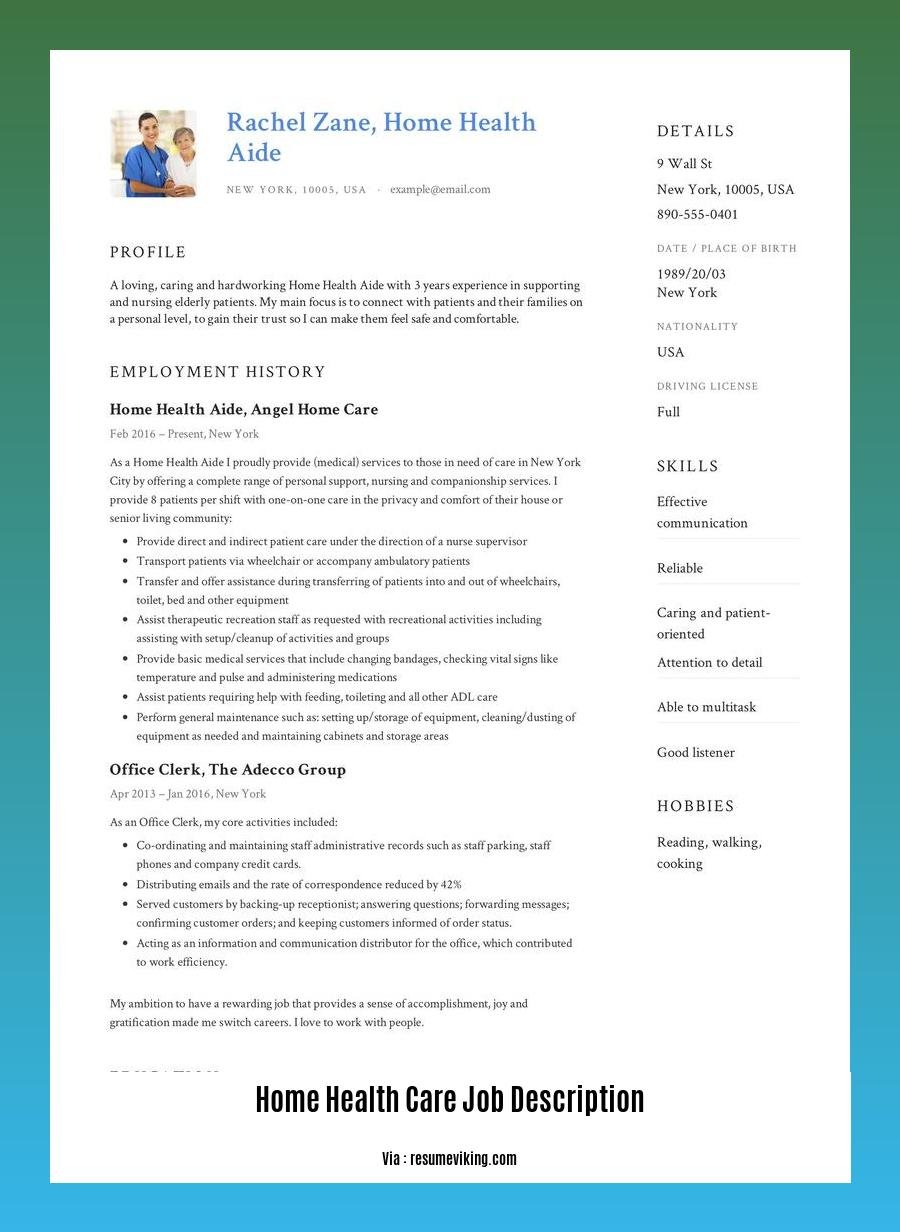Explore the Comprehensive Home Health Care Job Description: Providing Compassionate Care in Patients’ Homes. This definitive guide outlines the crucial role of home health care providers in delivering comprehensive care to individuals in their homes, ensuring their safety, comfort, and well-being. Discover the essential clinical skills, empathetic qualities, and collaborative nature that define successful home health care professionals.
Key Takeaways:
-
Provide comprehensive care to patients in their homes, ensuring safety, comfort, and well-being.
-
Responsibilities include medication management, wound care, monitoring vital signs, domestic tasks, and transportation assistance.
-
Required skills include monitoring vital signs, administering medications, basic nutrition and hygiene knowledge, communication, and physical assistance.
-
Job duties comprise assistance with daily living activities, vital signs monitoring, medication administration, emotional support, care plan development, and record-keeping.
Home Health Care Job Description

In the realm of healthcare, the role of a home health care provider transcends boundaries, extending the reach of medical assistance into the homes of individuals seeking solace and support. These dedicated professionals embody compassion, expertise, and unwavering dedication, administering care to patients in the comfort of their own living spaces. Discover the essence of this noble profession, its responsibilities, and the qualities that make home health care providers indispensable members of the healthcare team.
Understanding the Role of a Home Health Care Provider
Home health care providers are pillars of support for individuals navigating complex health challenges. They step into the homes of patients, bringing with them a wealth of clinical skills and emotional empathy. Their duties encompass a comprehensive range of tasks, striving to ensure the safety, comfort, and well-being of those under their care.
Core Responsibilities of Home Health Care Providers
The responsibilities of a home health care provider extend beyond clinical expertise, encompassing a holistic approach to patient care. Their duties may include:
- Clinical Care:
- Administering medications accurately and as prescribed.
- Monitoring vital signs to detect and respond to changes in patient health.
-
Providing wound care and ensuring proper management of medical conditions.
-
Personal Care:
- Assisting with activities of daily living (ADLs), such as bathing, dressing, and grooming.
- Facilitating mobility and transfers, ensuring the patient’s safety and comfort.
-
Managing continence needs with sensitivity and care.
-
Emotional Support:
- Offering a listening ear and providing emotional support to patients and their families.
- Recognizing and addressing psychosocial needs that may impact the patient’s health.
- Collaborating with other healthcare professionals to develop a comprehensive care plan that addresses the patient’s holistic needs.
Essential Qualities of a Home Health Care Provider
Home health care providers are distinguished by their unique blend of clinical competence and interpersonal skills. They possess the following qualities:
- Clinical Proficiency:
- Strong understanding of medical terminology, anatomy, and physiology.
- Proficiency in performing clinical procedures, such as wound care, medication administration, and vital signs monitoring.
-
Familiarity with common medical conditions and their management protocols.
-
Empathetic Nature:
- Demonstrating empathy towards patients and their families, understanding their emotional needs.
-
Building rapport and establishing a trusting relationship with patients, fostering open communication.
-
Communication and Collaboration:
- Possessing exceptional communication skills, effectively conveying information to patients, families, and other healthcare professionals.
-
Collaborating effectively with interdisciplinary teams, ensuring continuity of care and a comprehensive approach to patient management.
-
Professionalism and Ethics:
- Maintaining a high level of professionalism, adhering to ethical guidelines and patient confidentiality.
- Demonstrating integrity, honesty, and accountability in all aspects of care provision.
Conclusion
Home health care providers are invaluable assets in the healthcare system, delivering compassionate care and support to individuals in the comfort of their own homes. Their dedication and expertise play a pivotal role in enhancing the quality of life for patients and their families. If you possess the qualities and passion required for this noble profession, consider embarking on a journey as a home health care provider, making a profound difference in the lives of those you serve.
-
Want to pursue a career in home health care but don’t know where to start? Look no further! Join our home health care free training program and kick-start your journey toward a rewarding career in home health care today!
-
Philadelphia residents, seeking exceptional home health care services? Look no further! Home health care in Philadelphia offers top-notch care to ensure your loved ones receive the best treatment.
-
Based in Philadelphia, Pennsylvania, and seeking home health care services? Choose our reliable organization by clicking on the home health care Philadelphia PA link. Discover the compassionate care your loved ones deserve.
Benefits of Working in Home Health Care
Are you passionate about aiding people in living dignified lives in the comfort of their homes? A career in home health care might be the perfect path for you. This growing field offers numerous advantages that can reshape your life and the lives of those you care for. Let’s dive into the fulfilling Benefits of Working in Home Health Care:
1. Patient-Centered Care:
Home health care providers have the unique opportunity to provide personalized and holistic care. You’ll work closely with individuals and their families, nurturing meaningful relationships that go beyond medical treatment. The focus is on enhancing overall well-being by addressing physical, emotional, and social needs.
2. Job Flexibility:
The flexibility of home health care jobs is unmatched. You have the autonomy to create a schedule that accommodates your personal life. Manage your time efficiently to ensure a healthy work-life balance, pursue other interests, or spend more time with loved ones.
3. Career Growth Opportunities:
Home health care is a dynamic and ever-evolving field, presenting ample opportunities for professional growth. With experience, you can advance your career by specializing in different areas, taking on leadership roles, or pursuing higher education. The possibilities are endless.
4. Making a Meaningful Impact:
Home health care providers play a pivotal role in preserving individuals’ dignity, independence, and quality of life. You’ll witness firsthand the positive impact of your work on the lives of those you care for and their families. The feeling of fulfillment and purpose is truly remarkable.
Key Takeaways:
- Home health care providers offer personalized care and cultivate meaningful relationships with patients.
- This role enables you to create a flexible work schedule and achieve a healthy work-life balance.
- Home health care offers numerous opportunities for career growth, specialization, and leadership roles.
- It provides a profound sense of fulfillment by positively impacting individuals’ lives and preserving their independence.
Sources:
- Home Health Care Nurse: Job Description, Salary, and Education Requirements
- Benefits of Being a Home Health Aide
Challenges of Working in Home Health Care

In the field of home health care, we’re committed to providing compassionate care in patients’ homes. But this rewarding work comes with its own set of challenges that we must navigate.
Key Takeaways:
-
Providing care in a home setting can be unpredictable, with unique patient needs and challenges each day.
-
The challenges of working in home health care can be categorized into four main areas: caregiver stress, patient and family dynamics, time constraints, and documentation burdens.
-
Self-care, support from management, and effective communication strategies can help home health care providers manage these challenges and deliver exceptional care.
-
Understanding and managing these challenges is crucial for providing quality care and ensuring the well-being of both patients and home health care providers.
-
We must recognize and address these challenges to ensure the continued success and sustainability of home health care services.
Consider these top challenges that home health care providers face:
Managing Unique Patient Situations
Every patient’s home and needs are unique. We need to adapt our care approach to various living conditions, family dynamics, and cultural preferences.
Coordinating Care with Multiple Caregivers
Collaboration is key. We work with doctors, nurses, therapists, and other healthcare professionals to provide comprehensive care. Coordination can be complex, especially with different schedules and preferences.
Documentation and Regulatory Compliance
Documentation is a crucial part of our job, ensuring accurate and up-to-date patient records. Keeping up with changing regulations and reporting requirements can be time-consuming.
The Emotional Toll of Caregiving
Providing care can be emotionally challenging. We witness patients’ suffering and loss, and we often develop close relationships with them and their families. Dealing with these emotions can be draining.
Strategies for Managing Challenges:
-
Self-care: We prioritize our physical and mental well-being through self-care practices like exercise, mindfulness, and seeking support from family and friends.
-
Support from Management: We seek support from supervisors and managers who understand the challenges we face and provide guidance, resources, and emotional support.
-
Effective Communication: We cultivate strong communication skills to effectively collaborate with team members, patients, and families, ensuring clarity, empathy, and respect.
-
Time Management: We prioritize tasks, delegate responsibilities when appropriate, and use technology to streamline documentation and communication.
-
Professional Development: We continuously seek opportunities for professional development to enhance our skills, stay updated on the latest advancements, and improve our ability to provide quality care.
Despite the challenges, working in home health care is incredibly rewarding. We make a real difference in the lives of our patients and their families, providing comfort, support, and peace of mind.
Sources:
Challenges in Home Health Care Nursing
10 Execs Share Top Home Health Agency and Home Care Agency Challenges
How to Get Started in a Career in Home Health Care
Have you ever considered a career in home health care? It’s a rewarding field that allows you to make a real difference in the lives of others. If you’re compassionate, patient, and have a desire to help people, then this could be the perfect career for you.
Key Takeaways:
-
Job Description: Home health care providers offer medical assistance and support to individuals in their homes, including clinical care (medication management, wound care), personal care (bathing, dressing), and emotional support.
-
Essential Qualities: To thrive in this role, you should possess clinical proficiency, empathy, strong communication and collaboration skills, and a professional demeanor.
-
Benefits: Home health care providers enjoy personalized care, flexible schedules, and opportunities for career advancement.
-
Challenges: Like any job, home health care has its challenges. Employee retention, caregiver engagement, and training can be difficult. Agencies must manage operations, client-caregiver dynamics, and cultural differences.
Steps to Get Started:
-
Gain Training and Certification: While not always required, certification courses can provide valuable knowledge and skills.
-
Acquire Experience: Volunteer as a companion or sitter to gain hands-on experience and assess your suitability for the role.
-
Explore Agency Opportunities: Consider working with home care agencies to find consistent work and support.
-
Pursue Additional Education: Consider pursuing higher education, such as a nursing degree, to open up more career opportunities.
Pros and Cons of a Home Health Care Career:
Pros:
-
Make a Difference: You’ll have the opportunity to make a real difference in the lives of your patients and their families.
-
Flexible Schedule: Home health care providers often have more control over their schedules, allowing for a better work-life balance.
-
Career Advancement: Home health care is a rapidly growing field, offering opportunities for career advancement.
Cons:
-
Emotional Challenges: Working with patients who are sick or dying can be emotionally challenging.
-
Physical Demands: The job can be physically demanding, requiring lifting and moving patients.
-
Irregular Hours: Home health care providers may need to work evenings, weekends, and holidays.
Are You Ready for a Rewarding Career in Home Health Care?
If you are compassionate, patient, and have a desire to help people, then a career in home health care may be the perfect fit for you. With the right training and experience, you can make a real difference in the lives of others.
Relevant Sources:
- How To Become a Home Care Provider | Indeed.com
- Home Health Aide Job Description: Top Skills and Duties in 2022 – Hirat…
FAQ
Q1: What are the essential qualifications for a Home Health Aide?
A1: To become a Home Health Aide, you typically need a high school diploma or equivalent, relevant training or certification in home health care, strong communication and interpersonal skills, and the ability to lift and transfer patients. Additionally, current certification in CPR and First Aid is required.
Q2: What are the primary responsibilities of a Home Health Aide?
A2: The primary responsibilities of a Home Health Aide include providing assistance with activities of daily living such as bathing, dressing, eating, and toileting; monitoring vital signs and reporting any changes to the patient’s healthcare provider; administering medications according to the patient’s prescription; providing emotional support to the patient and their family; working with the patient’s healthcare provider to develop and implement a care plan; and maintaining accurate records of the patient’s care.
Q3: What are the benefits of working as a Home Health Aide?
A3: Some benefits of working as a Home Health Aide include the opportunity to provide personalized care and develop meaningful relationships with patients, flexibility in scheduling, growth opportunities within the rapidly growing field of home health care, and the chance to make a positive impact on the lives of others.
Q4: What are the challenges faced by Home Health Aides?
A4: Some challenges faced by Home Health Aides include high caregiver turnover rates due to low pay, lack of benefits, and limited opportunities for advancement; difficulty engaging and motivating caregivers to provide high-quality care; ensuring that caregivers have the necessary skills and knowledge to provide safe and effective care; managing the day-to-day operations of the agency; and addressing cultural and linguistic differences between clients and caregivers.
Q5: How can I become a Home Health Aide?
A5: To become a Home Health Aide, you can consider gaining training and certification in home health care, acquiring experience by volunteering as a companion or sitter, exploring agency opportunities to find consistent work and support, and pursuing additional education such as a nursing degree to open up more career opportunities.
- Does 100% Polyester Shrink? A Complete Guide to Washing & Drying - April 16, 2025
- Elegant Drapery Solutions for Arched Windows: A Complete Guide - April 16, 2025
- The Best Dining Room Tables with Drop Leaves: A Buyer’s Guide - April 16, 2025










